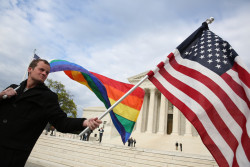
NCLR was proud to join Garden State Equality in asking the New Jersey legislature and governor to pass this life-saving legislation, and then to represent GSE in successfully urging the federal courts to reject this legal challenge and uphold the law.
At the time Governor Chris Christie signed the bill into law on August 19, 2013, New Jersey was the second state after California to pass legislation protecting against harmful efforts by licensed therapists to change a young person’s sexual orientation or gender identity – practices that put youth at risk of serious lifelong harm, including depression, substance abuse, and suicide. Since that time, similar laws have been passed in Washington, D.C., Oregon, and Illinois, and NCLR’s #BornPerfect campaign is working with leaders in dozens of other states to bring the same protections to young people everywhere.
Wherever these laws have been challenged, NCLR has also stood ready to defend them in the courts. And we’ve been successful. Federal appeals courts have uniformly rejected legal challenges to these laws brought by anti-LGBTQ legal groups representing therapists, minors, and parents who want to preserve these outdated and dangerous “treatments.”
These federal court decisions rest on the common-sense principle that states have the power to regulate medical care to protect patients from treatments that are ineffective and risky. Just as a doctor or patient has no right to administer or receive untested or unsafe prescription medications, therapists have no right to engage in so-called treatments that do not benefit minors and expose them to serious risks of harm. Laws protecting minors from conversion therapy are based on a strong scientific consensus among medical and mental health professionals, and states have a right—and a duty—to make sure licensed therapists are not engaging in these harmful and discredited practices.
In 2014, NCLR launched #BornPerfect: NCLR’s Campaign to End Conversion Therapy in five years. Learn more about #BornPerfect.









